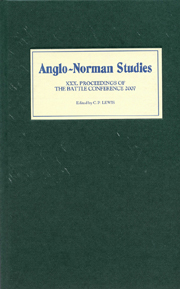Book contents
- Frontmatter
- Contents
- LIST OF ILLUSTRATIONS, MAPS, AND TABLES
- EDITOR'S PREFACE
- ABBREVIATIONS
- The Normans in Welsh History (R. Allen Brown Memorial Lecture)
- William Marshal, Lancelot, and Arthur: Chivalry and Kingship
- Grades of Ordination and Clerical Careers, c. 900–c. 1200
- Evesham J and Evesham L: Two Early Twelfth-Century Manorial Surveys
- Aspects of Church Reform in Wales, c. 1093–c. 1223
- Lay Charters and the Acta of Henry II
- Reinventing Normans as Crusaders? Ralph of Caen's Gesta Tancredi
- Kings, Lords, Charters, and the Political Culture of Twelfth-Century Wales
- Identifying the Warrior on the Pre-Heraldic Battlefield
- St Nicholas the Pilgrim and the City of Trani between Greeks and Normans, c. 1090–c. 1140
- The ‘Resurgence’ of Powys in the Late Eleventh and Early Twelfth Centuries
- Interpreter Families and Anglo-Welsh Relations in the Shropshire-Powys Marches in the Twelfth Century
- A Taste for the Antique? Henry of Blois and the Arts
The Normans in Welsh History (R. Allen Brown Memorial Lecture)
Published online by Cambridge University Press: 12 September 2012
- Frontmatter
- Contents
- LIST OF ILLUSTRATIONS, MAPS, AND TABLES
- EDITOR'S PREFACE
- ABBREVIATIONS
- The Normans in Welsh History (R. Allen Brown Memorial Lecture)
- William Marshal, Lancelot, and Arthur: Chivalry and Kingship
- Grades of Ordination and Clerical Careers, c. 900–c. 1200
- Evesham J and Evesham L: Two Early Twelfth-Century Manorial Surveys
- Aspects of Church Reform in Wales, c. 1093–c. 1223
- Lay Charters and the Acta of Henry II
- Reinventing Normans as Crusaders? Ralph of Caen's Gesta Tancredi
- Kings, Lords, Charters, and the Political Culture of Twelfth-Century Wales
- Identifying the Warrior on the Pre-Heraldic Battlefield
- St Nicholas the Pilgrim and the City of Trani between Greeks and Normans, c. 1090–c. 1140
- The ‘Resurgence’ of Powys in the Late Eleventh and Early Twelfth Centuries
- Interpreter Families and Anglo-Welsh Relations in the Shropshire-Powys Marches in the Twelfth Century
- A Taste for the Antique? Henry of Blois and the Arts
Summary
Although Allen Brown did not write extensively about Wales, he was certain that the Normans had made a big difference to its history by inaugurating a conquest that was completed, some two centuries later, by Edward I. Members of the Battle Conference, on its visit to Gregynog, about eight miles west of the motte of Hen Domen near Montgomery, will hardly need persuasion that Norman conquest and settlement were significant in Wales. After all, in the late eleventh and twelfth centuries the Normans and their allies established control over a substantial swathe of the country, extending in an arc along its eastern borders and southern coast, and created marcher lordships that enjoyed extensive autonomy until the reign of Henry VIII. Yet precisely how much difference the Normans made is a matter for continuing debate. Now, I should explain at the outset that my aim is not to try and assess the nature and impact of Norman conquest and settlement in Wales. Rather, what follows will focus on how historians have viewed the place of the Normans in Welsh history, and especially how and how far these conquerors have been integrated into narratives of national history. In other words, this paper is essentially historiographical in its approach. True, Allen Brown was somewhat impatient of the efforts of previous scholars, who, he believed, had muddied the waters by their partisan stance in relation to the Norman conquest of England.
- Type
- Chapter
- Information
- Anglo-Norman Studies 30Proceedings of the Battle Conference 2007, pp. 1 - 18Publisher: Boydell & BrewerPrint publication year: 2008



